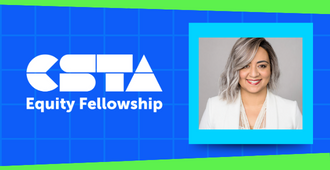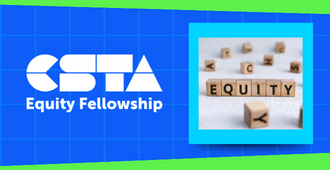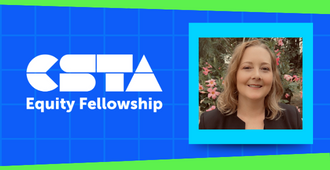Posted by CSTA on May 02, 2023
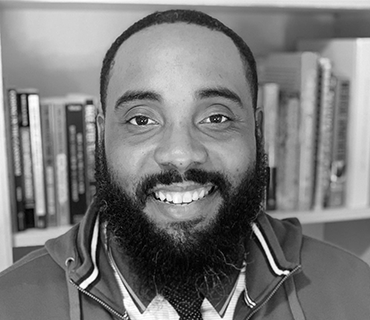
“Every student enters the classroom with their own backstory and life experiences that are unique to them.”
Full Story
Allen Antoine, M.Ed., is Director of Computer Science Education Strategy for EPIC (Expanding Pathways in Computing) at UT Austin’s Texas Advanced Computing Center (TACC), where he provides leadership in computer science education to manage rapidly expanding diversity, equity, and inclusion initiatives. He also serves as the project director for the Computer Educator Diversity Initiative (CEDI), a role in which he trains computer science educators on equitable teaching practices that prepare them to approach their teaching with diversity in mind.
With over fifteen years of experience in the educational field, Allen has taught middle school math, worked with elementary students on literacy and numeracy skills, and developed curriculum for Alief Independent School District and Rice University. He’s a seasoned presenter, consultant, and workshop leader on topics including school culture, equity and inclusion, and culturally responsive teaching. Allen is also the current vice president of CSTA Greater Houston.
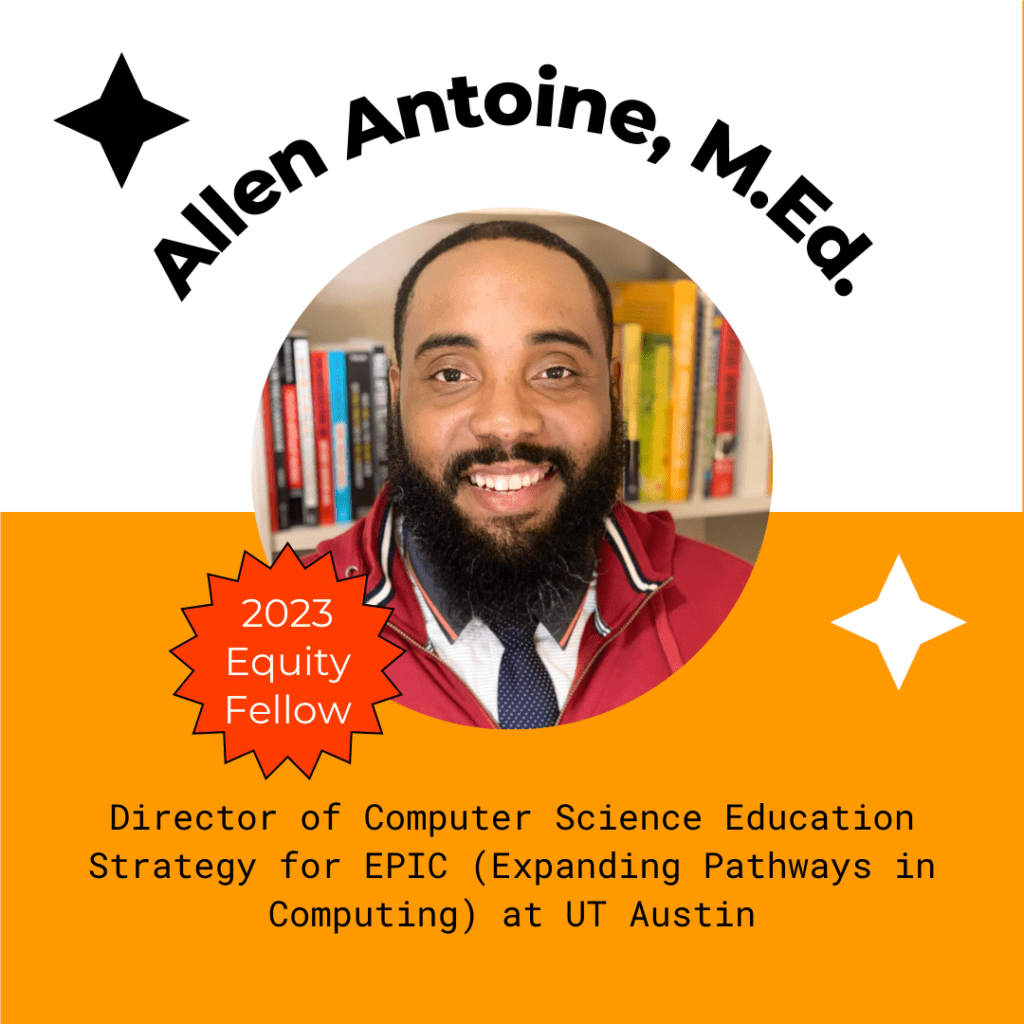
Allen believes passionately in tailoring instruction to individual student interests, identities, and experiences. Although his work aims to meet diversity goals in CS education at the local, state, and national levels, he considers it imperative to put the students’ individual contexts first. “Every student enters the classroom with their own backstory and life experiences that are unique to them,” he points out. “One way that I promote equity in my teaching practice is to focus on exposure and mapping a realistic blueprint for student success.”
That blueprint can’t look the same from district to district, school to school, or even student to student. As the Associate Director of Mathematics and Computer Science for the Rice Office of STEM Engagement, Allen created professional development and certificate preparation programs for computer science educators, with a special emphasis on recruiting teachers from Title I schools. “I have challenged teachers to think of the students they will see in their classrooms and which strategy could be used to reach them,” he says. “I have developed various exercises that focus on making programming courses social and adding opportunities for self-expression within their daily lessons.”
Allen also developed a partnership with the Social Justice Learning Institute’s Urban Scholars program to introduce students from high-need schools in Houston ISD to computer science concepts in a culturally relevant way, by examining health disparities in student neighborhoods. He built on this health-focused work when developing the Digital Health Scholars (DHS) program, which has been offered since 2018 in partnership with the Precise Advanced Technologies and Health Systems for Underserved Populations Engineering Research Center. In their summer learning experience, the Digital Scholars—overwhelmingly female and minority students—have developed apps and wearable health monitoring devices to tackle health problems in their communities.
Building a diverse cohort of computer science students depends on close, personal work with the students themselves, but Allen also remembers not to miss the forest for the trees. The success of computer science education depends on a robust, engaged, well-prepared cohort of computer science educators who are committed to the success of a diverse student population.
“I think about this problem from a 1000-foot view and attempt to diversify the pipeline with proven strategies of engagement and inclusion,” says Allen. In his seven years at EPIC, he’s developed and administered training modules for prospective computer science teachers and participated in grant projects to expand access to CS for underrepresented students. Additionally, as a part of the Expanding Computing Education Pathways (ECEP) Alliance, Allen was instrumental in the creation and continuous redesign of the Strategies for Effective and Inclusive Computer Science Teaching online course which aims to nationally disseminate equity-explicit professional development for K-12 teachers through the Scaling Inclusive Pedagogy (ScIP) project.
Allen is an Endorsed Trainer/Ambassador for Bootstrap, teaching educators to introduce computer science concepts and practices into traditional mathematics courses. As director of CEDI, he has overseen the recruitment and training of fifty Texas computer science educators from historically underrepresented groups in the last two years, and he plans to continue the growth of the program with new cohorts in future years. By helping to build the pipeline of computer science educators from populations underrepresented in the field, Allen is making the field more inclusive and accessible to girls, nonbinary students, students of color, and students with disabilities.
In his time as a CSTA Equity Fellow, Allen is excited to deepen his knowledge of CSTA standards, develop his leadership skills, and expand his professional network of like-minded educators. “This experience will undoubtedly serve as an opportunity to further grow my educational network and build a community that I can be proud to be a part of,” Allen says, adding, “CSTA is, above all, a voice for teachers that is driven by teachers.”
Allen’s time as an educator has taught him that student enthusiasm and engagement skyrockets when they have the opportunity to use physical computing devices like micro:bit, Arduino, Sphero, and others. He’s excited to broaden his knowledge of physical computing tools and develop trainings that use these devices to connect computer science standards to culturally relevant learning experiences. Because not every teacher, class, or student has access to physical computing devices, Allen is also eager to research online learning environments that behave similarly to physical computing devices. That way, the hands-on experience of working with such devices can be replicated in the virtual space to reach larger student populations while still pursuing the goal of maximizing student engagement.
As a veteran trainer on culturally responsive teaching, Allen also hopes to work with the team to develop web-based workshops that explore culturally responsive teaching practices in virtual settings. “Rather than focusing only on the need for culturally responsive pedagogy,” Allen notes that he hopes “to give educators the opportunity to shift existing CS teaching practices to those that are more welcoming for diverse student populations.”
Through the CSTA Equity Fellowship, Allen will continue pursuing his work to create a more welcoming and inclusive computer science experience for students and teachers alike. “One of the most effective ways to help students build a CS identity is to give them role models with whom they can identify,” he says. “We have started to make that dream a reality.”

